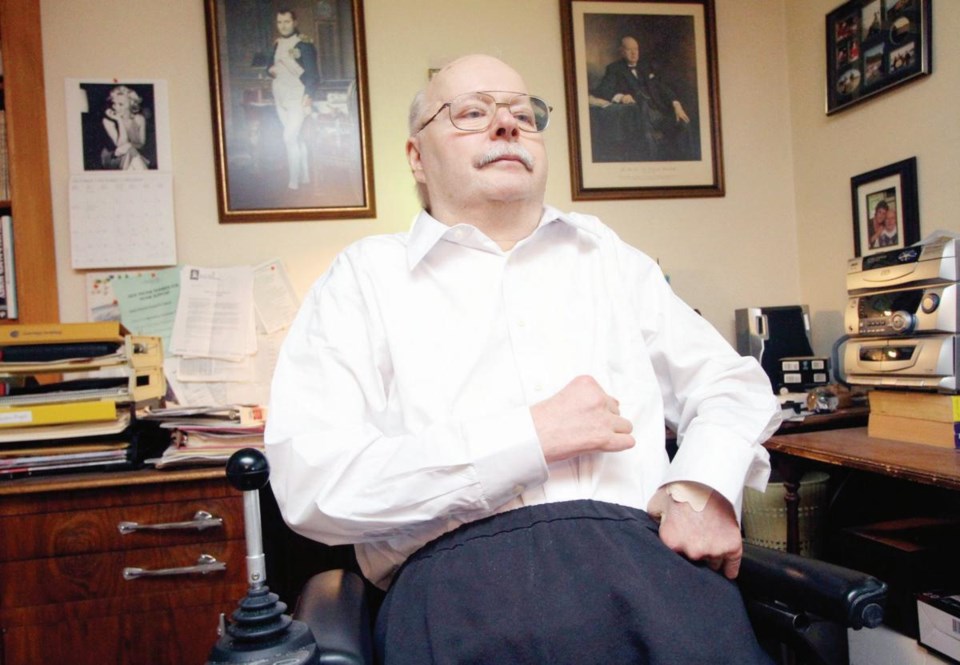Gordon Argyle is anxious to get back to work despite the lingering effects of a car accident that left him paralyzed from the shoulders down 36 years ago.
Argyle, 60, is on leave, but hoping a few chronic health issues will be cleared up soon, so he can get back to doing what he does best: advocating for people with disabilities - something he's done for more than two decades.
Argyle works at the University of Victoria as accessibility co-ordinator, advising to ensure buildings remain open and usable to people with disabilities. It's a job he has held since 2000, and he misses it.
"The phone never seems to stop ringing there," Argyle said in an interview at his James Bay apartment home. "It's super busy, it's good."
The university hired Argyle after he spent several years on contract assisting UVic, and many years previously lobbying on behalf of disabled students.
Argyle retains control of his biceps but movement below his elbows is affected. He uses an electric wheelchair but requires home-care assistance to get in and out of bed and help with things like meals and cleanup.
But his working career hardly seems to have stopped, with the exception of the first two years after his car accident in downtown Victoria in 1976 - during which Argyle was undergoing rehabilitation and recovering from three surgeries, sometimes with less-than-optimum results.
Argyle sold real estate and worked as a property developer before and after the accident, which occurred when the car he was driving was T-boned by a taxi. He was 24.
After taking a financial hit during the early 1980s, Argyle returned to university to complete a bachelor's degree, and later, a master's in history.
While at UVic, he formed, with two other students, the Society for Disabled Students and began lobbying for improved accessibility to the buildings and looking for more and better-equipped washrooms.
He also spent two years on a committee hammering out a policy related to disabled students.
Outside the university, Argyle spent 17 years working on, even chairing, a committee advising B.C.
Transit on routes and accessibility. He has also worked with the Capital Health Region, later the Vancouver Island Health Authority, and the provincial government on retaining support for community care.
With all his achievements, Argyle never fails to speak with gratitude of the people who assisted him.
For his physical rehabilitation, Argyle lauds the G.F. Strong Centre in Vancouver, where "they do great work."
For his successful transition from rehabilitation programs to living in the community, he credits his brother, sister-in-law and family. "They have been there constantly."
On the completion of a 200-page master's thesis, he says, "I had a really good adviser."
For his successful efforts to make UVic accessible for students with disabilities, he points to UVic president David Turpin, who "has been tremendous."
And on his continuing ability to live in his own home, he says: "Without the home care, I would be in an institution."
The only memory Argyle recounts with anything close to bitterness was the opposition of some UVic faculty members who resisted giving breaks to disabled students to complete their academic work, on the grounds that it would dilute the academic credentials of the university.
That meant writing a policy for disabled students took two years instead of the six months Argyle originally foresaw.
"The one time I actually got angry was when one professor suggested we put a letter A on the degree to denote you had been accommodated," he said.
Argyle said he types with two pencils tucked into Velcro pockets on the ends of his arms and is "pretty fast," so he didn't require any extra time to finish his academic work.
Some disabled students do need extra time, however, and that doesn't mean their efforts should receive lesser recognition with the affixing of a special letter A.
"I realized how hard some disabled students were working," he said. "It was a real battle, but it was progress."
These days, despite his recent health problems, Argyle enjoys travelling to places such as the Cayman Islands, California and Las Vegas.
"Everybody has problems," he said. "No one's life is easy.
"I've known people who give up and I just can't imagine doing that. It would just be so boring."



